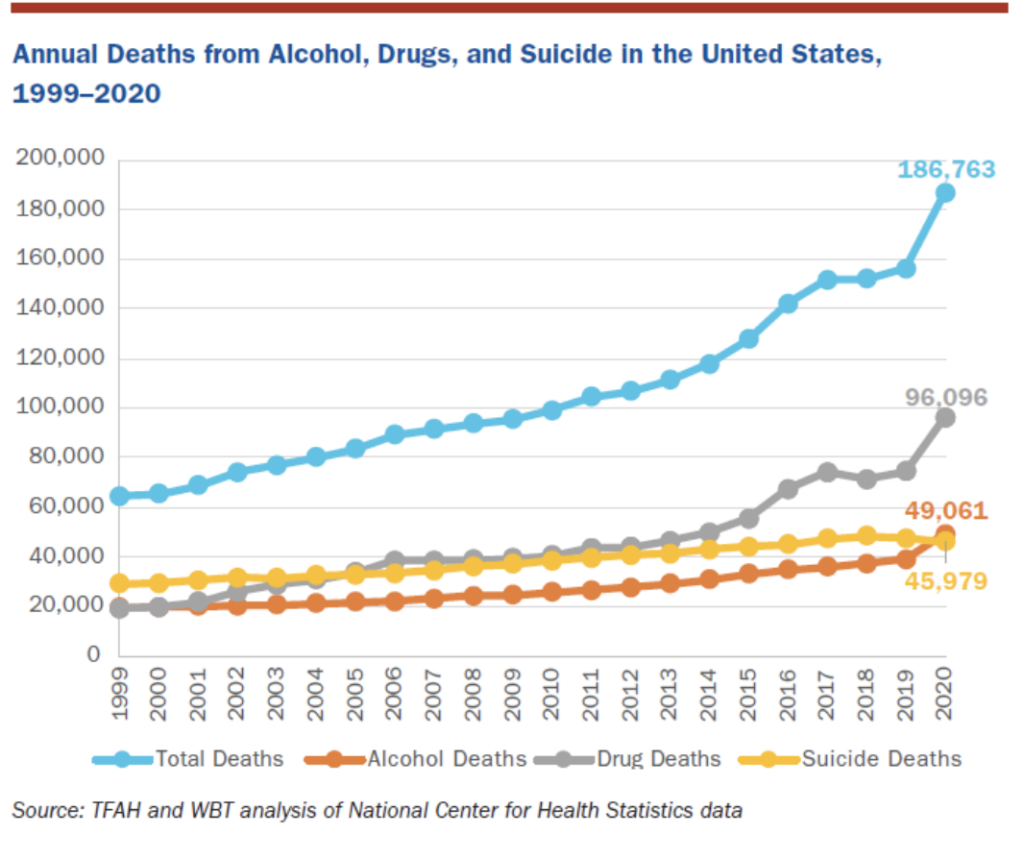By Brandon Reavis, Senior Government Relations Manager at Trust for America’s Health
When Trust for America’s Health (TFAH) and Well Being Trust began our Pain in the Nation report series examining the alcohol, drug, and suicide crises in the United States in 2017, drug-induced causes accounted for 55,403 deaths per year. Five years later, the 2022 report shows that more than 95,000 Americans lost their lives from drug-induced causes in 2020—a record 30 percent increase since 2019. Alcohol-induced deaths also increased by a stunning 27 percent during the same time period. Troublingly, recent provisional data from the Centers for Disease Control and Prevention (CDC) show more than 100,000 fatal drug overdoses in 2021, driven in part by a significant rise in synthetic opioid-related deaths.

Although the stressors of the COVID-19 pandemic, including housing instability, food insecurity, job loss, and grief, have contributed to rising overdose rates, drug-induced deaths have been increasing significantly over the past two decades. These trends require legislators, public health officials, and other stakeholders to recognize the shortcomings of existing policy efforts. The fact that communities of color experienced the highest rates of deaths due to drug use in 2020—deaths among Black people increased by 41 percent between 2019 and 2020, for example—also calls for policies that address the unique concerns of underserved populations.
In Pain in the Nation, TFAH and Well Being Trust share recommendations in three major areas to address the deaths of despair crisis and its disproportionate impacts among the Black, Latino, and American Indian/Alaska Native populations. First, we need to invest in evidence-based programs to address the social and economic conditions that impact behavioral health outcomes, including initiatives to prevent adverse childhood experiences (ACEs) and expand resiliency programs in schools. As part of this effort, Congress should increase funding for CDC programs to prevent suicide, reduce ACEs, and promote safe communities. Second, we should address the current drug overdose crisis through harm-reduction policies to prevent overdoses and blood-borne infections, including increased access to syringe services programs, naloxone, and fentanyl testing strips. Policymakers should also target the prevention of substance misuse among youth and ensure that pandemic-related flexibilities in telehealth treatment account for disparities by race, ethnicity, income, and other factors. Finally, we must transform the mental health and substance use prevention system by enforcing mental health parity, integrating physical and mental health services, and diversifying and expanding the behavioral health workforce. Investments in the community healthcare workforce and improved data collection could also help expand preventive efforts and identify concerning trends and inequities.
On July 14, expert panelists joined TFAH President and CEO Dr. J. Nadine Gracia for a Congressional briefing and national webinar to expand on these recommendations and provide further guidance to policymakers. Dr. Benjamin Miller, President of Well Being Trust, emphasized the importance of integrating mind and body care, expanding the community behavioral health workforce, and leveraging the new 988 lifeline to implement broader mental health reform. Dr. Arthur Evans, CEO and Executive Vice President of the American Psychological Association, discussed the need for a population health approach to the mental health and substance use crises focused on multiple levels of intervention. Finally, Schroeder Stribling, CEO of Mental Health America (MHA), shared data showing high rates of suicidal ideation among youth and large increases in self-harm thoughts among communities of color. Ms. Stribling also highlighted MHA efforts to engage individuals with lived experiences in creating community solutions to mental health issues.
This webinar discussion underscored the importance of urgent action through policies and programs that address harmful economic and social conditions, promote resiliency and reduce harms, and transform our systems of healing. Without these actions, pain in our nation will continue to lead to deaths of despair and other long-lasting consequences for American communities.
For the full report and detailed policy recommendations, visit https://www.tfah.org/report-details/pain-in-the-nation-2022/.
For a recording and slides from the July 14 webinar, visit https://www.tfah.org/webinars-briefings/pain-in-the-nation-2022-briefing-webinar/.

